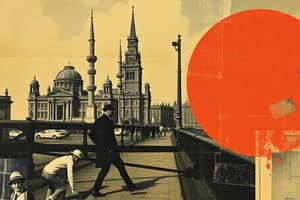Podcast
Questions and Answers
Which of the following is not a scarce resource?
Which of the following is not a scarce resource?
- Petroleum
- Time
- Lumber
- Knowledge (correct)
- Clean Water
- Minerals
- Clean Air
What is the opportunity cost of taking a break from studying to watch a movie?
What is the opportunity cost of taking a break from studying to watch a movie?
The opportunity cost of watching a movie is the time and effort that could have been spent studying. For example, if you spent 2 hours watching a movie, you could have studied for an extra 2 hours during that time.
Marginal analysis involves making decisions based on all possible options, not just the available opportunities.
Marginal analysis involves making decisions based on all possible options, not just the available opportunities.
False (B)
Suppose a bakery is offering a 'buy one, get one free' deal on bread. What economic principle is this an example of?
Suppose a bakery is offering a 'buy one, get one free' deal on bread. What economic principle is this an example of?
What is the main reason why people specialize in certain tasks or jobs?
What is the main reason why people specialize in certain tasks or jobs?
A situation where no individual can improve their situation by changing their behavior is known as:
A situation where no individual can improve their situation by changing their behavior is known as:
Efficiency implies that all resources are allocated fairly and equitably.
Efficiency implies that all resources are allocated fairly and equitably.
Explain why government intervention might be necessary even when markets are generally efficient.
Explain why government intervention might be necessary even when markets are generally efficient.
A decrease in consumer spending during a recession can lead to further drops in business spending, layoffs, and unemployment. This is an example of:
A decrease in consumer spending during a recession can lead to further drops in business spending, layoffs, and unemployment. This is an example of:
Government policy can help address imbalances in spending - for example, increasing government spending during times of recession.
Government policy can help address imbalances in spending - for example, increasing government spending during times of recession.
Economic growth is the increase in ______ over time.
Economic growth is the increase in ______ over time.
What can contribute to a country's economic potential?
What can contribute to a country's economic potential?
Flashcards
What is a resource?
What is a resource?
Anything that can be used to produce something else.
What is scarcity?
What is scarcity?
When there isn't enough of a resource to satisfy all the ways people want to use it.
What is opportunity cost?
What is opportunity cost?
The value of what you give up to get something else.
What is a marginal decision?
What is a marginal decision?
Signup and view all the flashcards
What is marginal analysis?
What is marginal analysis?
Signup and view all the flashcards
What is an incentive?
What is an incentive?
Signup and view all the flashcards
What is an economy's potential?
What is an economy's potential?
Signup and view all the flashcards
What is economic growth?
What is economic growth?
Signup and view all the flashcards
What is specialization?
What is specialization?
Signup and view all the flashcards
What is equilibrium?
What is equilibrium?
Signup and view all the flashcards
What is efficiency?
What is efficiency?
Signup and view all the flashcards
What is equity?
What is equity?
Signup and view all the flashcards
What is a market failure?
What is a market failure?
Signup and view all the flashcards
What is government intervention?
What is government intervention?
Signup and view all the flashcards
How does spending affect income?
How does spending affect income?
Signup and view all the flashcards
What happens when overall spending gets out of line?
What happens when overall spending gets out of line?
Signup and view all the flashcards
What is a recession?
What is a recession?
Signup and view all the flashcards
What is inflation?
What is inflation?
Signup and view all the flashcards
What are government policies for spending imbalances?
What are government policies for spending imbalances?
Signup and view all the flashcards
What is a trade-off?
What is a trade-off?
Signup and view all the flashcards
What are gains from trade?
What are gains from trade?
Signup and view all the flashcards
What is the 'how much' decision?
What is the 'how much' decision?
Signup and view all the flashcards
What is the incentive principle?
What is the incentive principle?
Signup and view all the flashcards
What is self-interest?
What is self-interest?
Signup and view all the flashcards
What is the concept of equilibrium in markets?
What is the concept of equilibrium in markets?
Signup and view all the flashcards
When is government intervention justified?
When is government intervention justified?
Signup and view all the flashcards
What is a common example of inequity?
What is a common example of inequity?
Signup and view all the flashcards
What drives economic growth?
What drives economic growth?
Signup and view all the flashcards
What are winners and losers in economic growth?
What are winners and losers in economic growth?
Signup and view all the flashcards
What is the role of government in managing the economy?
What is the role of government in managing the economy?
Signup and view all the flashcards
Study Notes
First Principles of Economics
- Economics textbook by Paul Krugman and Robin Wells, sixth edition, published 2021 by Worth Publishers
- The book is revised by Vitaly Terekhov
What You Will Learn in This Chapter
- Four principles guiding individual choices
- Four principles governing how individual choices interact
- Three principles illustrating economy-wide interactions
The Principles: Individual Choice, Part 1
-
Choices are necessary due to scarce resources
-
Resource: anything usable for producing something else
-
Scarcity: a resource's lack of availability to satisfy all societal needs
-
Scarce resources include: minerals, lumber, petroleum, time, human skills, clean air, and clean water
The Principles: Individual Choice, Part 2
- Opportunity cost: the value of the next best alternative forgone
- Mark Zuckerberg's decision to drop out of Harvard exemplifies opportunity cost
The Principles: Individual Choice, Part 3
- Decisions often involve trade-offs, comparing costs and benefits
- Marginal decisions focus on "how much" – whether to do a little more or less of something
- Marginal analysis studies marginal decisions
The Principles: Individual Choice, Part 4
- Marginal decision: a decision made at the margins of an activity (e.g., studying a bit more or less)
- Marginal analysis: the study of marginal decisions
The Principles: Individual Choice, Part 5
- People respond to incentives
- Incentive: anything offering rewards for behavior change
- Example: policies to reduce pollution, choosing between education or financial reward
Learn by Doing: Practice Question 1
- Costco offers free samples; customers eat until full. Do they face opportunity cost?
- Answer: Yes
Learn by Doing: Practice Question 2
- Costco offers free samples; economists label this as an example of
- Answer: Bad Incentives
The Principles: Interaction of Individual Choices, Part 1
- Gains from trade arise from specialization
- Specialization: each person focuses on tasks they excel at
The Principles: Interaction of Individual Choices, Part 2
- Markets typically move toward equilibrium
- Equilibrium: an economic state where no individual benefits from changing their actions
The Principles: Interaction of Individual Choices, Part 3
- Resources should be used efficiently for achieving societal goals
- Efficiency: opportunities to benefit people without worsening others' situations
The Principles: Interaction of Individual Choices, Part 4
- Equity: everyone gets a fair share; a condition
- Markets typically lead to efficiency, but intervention can improve societal welfare in cases of market failure
Learn by Doing: Practice Question 3
- Fast-food chains' task division (e.g., taking orders, preparing food, bagging) is an illustration of
- Answer: Specialization
Learn by Doing: Practice Question 4
- Low-skilled workers earning below poverty line is considered a failure related to
- Answer: Inequity
The Principles: Economy-Wide Interactions, Part 1
- One person's spending is another's income
- Recessions: decrease in business spending, less income, less spending leading to layoffs, rising unemployment
The Principles: Economy-Wide Interactions, Part 2
- Overall spending can deviate from the economy's productive capacity
- Government policy can influence spending to address these imbalances (e.g., recessions or inflation)
The Principles: Economy-Wide Interactions, Part 3
- Increased economic potential leads to economic growth over time
- Economic growth: increase in living standards over time
- Economy's potential: total goods/services it could produce
- Factors boosting potential: new technologies, availability of resources
- Disparities in growth impacts: uneven distribution for different groups
Learn by Doing: Discussion Question 1
- Wealthy people (like Oprah Winfrey and Jeff Bezos) still face scarcity
Studying That Suits You
Use AI to generate personalized quizzes and flashcards to suit your learning preferences.




